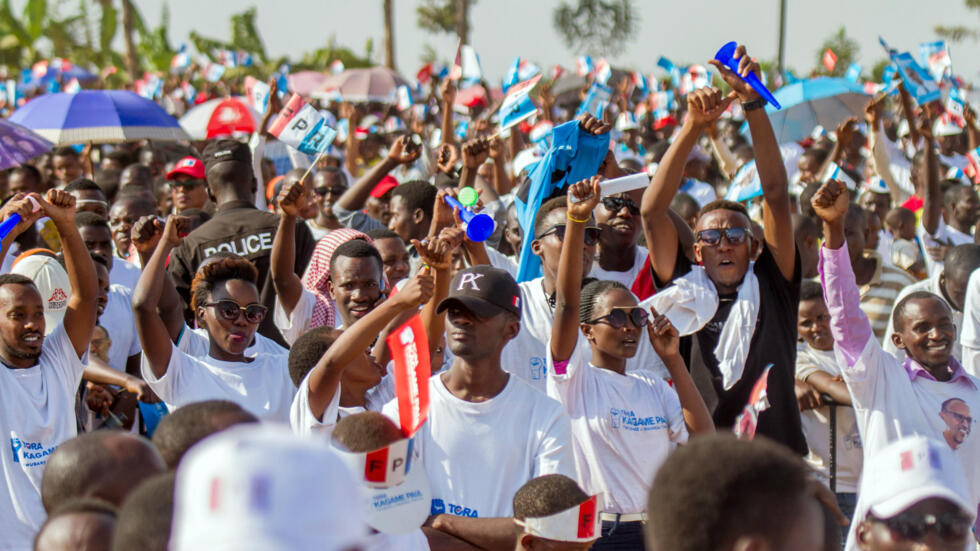Why so many Rwandans support Paul Kagame
Rwanda's National Electoral Commission was due to confirm Paul Kagame's landslide victory in last week's presidential election on Tuesday, eight days ahead of schedule. Although he is a controversial figure for some, the Rwandan Patriotic Front leader remains popular among Rwandans at home and abroad, as was clear on Friday in Paris.
Issued on: Modified:

Rwandans of all ages, clad in T-shirts emblazoned with the ruling party's FPR logo, celebrated in a Paris bar as news began to break of Kagame's victory.
"It is a victory for us, it is symbolic," said Desiré.
He had been determined take part in the celebration.
"If I was not here, I would not be feeling good," he added.
Over the course of the evening hundreds of Rwandans gathered in the bar in north-east Paris on Friday to watch the results come in.
Incumbent Kagame faced competition from Democratic Green Party candidate Frank Habineza and the independent Philippe Mpayimana.
But for many there was never really any doubt about the outcome.
"He did a lot for our country and people are grateful," said 20-year-old Angélique.
Close to seven million people - 98 percent of voters - backed Kagame's bid for a third term in power.
Habineza and Mpayimana won just 0.45 and 0.72 percent respectively.
Unhealthy democracy
Constitutional changes in 2015 allowed Kagame to run again this time. But critics worry that such an overwhelming victory by one man is unhealthy for democracy.
Not Fidel, though. “In Africa, we Africans have a very bad character, so we need a strong man to rule us ... especially after conflict," he said on Friday evening.
Kagame’s leadership over the past 17 years has been credited with bringing stability to Rwanda after the horrors of the 1994 genocide. Horrors that Clementou Rugamba knows all too well.
“You know in Rwanda one million people died because you had Hutus, you had Tutsis," he said. "We had divide, we had divide, and today, we are together. Today, we don’t have Hutus, we don’t have Tutsis. We are Rwandans."
Today in Rwanda ethnic labels are banned. Cirtics argue that this policy is being used to cover up inequalities notably against the majority Hutus, who fail to secure any of the top jobs.
Guardian of stability
Yet it’s on the issue of freedom that Paul Kagame is often attacked.
“We’ve heard these criticisms before," Jacques Kabale, Rwanda's ambassador to France, says dismissively. "But for Rwandans, these claims have no importance whatsoever. For them, human rights also means the right to exist and the right to security.”
That stability can only be guaranteed by Kagame, according to Constantin Ashimwe.
“What Kagame did for Rwanda, everybody can see it from the development, health care, we don’t need the opinions of these Western countries to see what Kagame did for all of our country!" he exclaimed.
The president has proved himself by allowing Rwanda to go from a shattered nation to one of the fastest growing economies in Africa, he believes.
But some argue that behind this veneer of development, lurks a darker reality.
Uncomfortable truths
RFI spoke to former Rwandan prime minister Faustin Twagiramungu, a Hutu, who claims that more than 30 members of his family were killed by Kagame’s forces when he twice invaded Congo to wipe out Hutu forces.
Twagiramungu wants Kagame to be charged with war crimes.
“Oh my God, we’re talking about Twagiramungu?" Ashimwe exclaims. "Every time that things are not in his favour, he has something to say you know.”
But so does the UN.
In 2010 the international body released a report confirming that Kagame's forces had carried out indiscriminate killings in its hunt for those responsible for the genocide.
But on Friday these uncomfortable questions couldn't be heard above the loud music.
And, despite the criticisms, Kagame is genuinely popular.
The same can't be said of the international community, so far as Friday's crowd were concerned.
“One million people, they were dying in Rwanda and everyone they were seeing and everyone they did nothing to save our people," Rugamba recalled.
"The UN they didn’t save a single person. They didn't. It was Paul Kagame who did it. We love him because of that."
Daily newsletterReceive essential international news every morning
Subscribe